The Year in Review: Celebrating Our Achievements in 2016 Part 1
2016 was a tremendous year of continued growth and progress for UF Health. In this “year-in-review” issue of OTSP, we highlight achievements in each of the colleges. Next week, we’ll do the same for our research centers and institutes, as well as our hospitals.
College of Dentistry
Dean: Isabel Garcia, D.D.S., M.P.H.
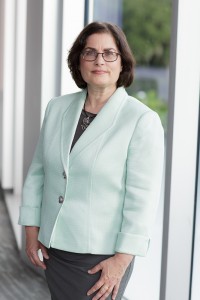 A continuous and dynamic team effort from faculty, staff, residents and students reaching together for excellence resulted in a very strong and successful 2016 for the College of Dentistry. Below are selected highlights to illustrate many of the accomplishments for 2016.
A continuous and dynamic team effort from faculty, staff, residents and students reaching together for excellence resulted in a very strong and successful 2016 for the College of Dentistry. Below are selected highlights to illustrate many of the accomplishments for 2016.
Education
- During 2016, the college began the phased implementation of its predoctoral (DMD) curriculum revision. The revised curriculum aligns with new accreditation standards, creates more small-group, case-based learning and dovetails cohesively with the timing of national dental testing.
- Our interprofessional learning programs continued to expand. Making Safe Moves, an innovative peer learning experience, was launched, allowing physical therapy students to teach dental students how to safely transfer patients with assistive devices into and out of the dental chair. Working with the College of Pharmacy, we created a new interprofessional educational experience for pharmacy and dental students beginning in Spring 2017. Using a simulated patient with dental-related pain, students will work together, focusing on their respective roles and responsibilities, patient assessment, management and prescription writing.
- Drawing on the collective strengths of the academic health center, the college is a co-lead on a grant from the Robert Wood Johnson Foundation to establish an interdisciplinary pilot program for the 2017 UF Summer Health Professions Education Program. The program is a collaboration of all six health colleges and will enable 80 underrepresented and minority students to participate in a six-week residential program to increase their awareness and preparedness for pursuing health careers.
- Diversity and inclusion efforts continued to be recognized and supported. The college was awarded the 2016 Health Professions Higher Education Excellence in Diversity, or HEED, Award from the publishers of INSIGHT Into Diversity, one of only three dental schools in 2016 to receive the award. Our scholarship support was enhanced by a four-year $2.5 million grant from the Health Resources and Services Administration that will help us recruit and retain qualified students from disadvantaged backgrounds and foster greater workforce diversity.
- A new Master’s degree in Operative Dentistry was launched, expanding advanced education opportunities for general dentists.
- Graduates of the college’s advanced education programs achieved a 100 percent pass rate on Part One of national board exams — the first step toward earning Diplomate status in their respective dental specialty areas.
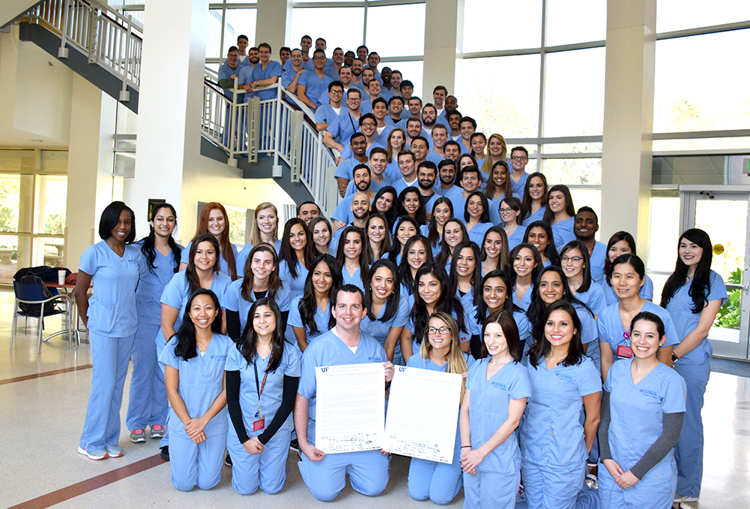
Patient Care
- Over 142,000 patient visits were made by patients from every county in Florida to college-owned clinics, an increase of 6 percent over last year. We received excellent results from annual patient satisfaction surveys, with 95 percent of patients reporting high levels of satisfaction with overall quality of care. Results also showed reduced wait times, with the majority of patients reporting less than two weeks between initial contact and the first appointment. This continues a trend of reduced wait times over the past five years.
- The college embarked on a hospitality and service initiative modeled after UF Health’s program, providing a set of standards addressing four areas: hospitality, teamwork, communication, professionalism and responsibility.
- A new marketing workgroup is focused on enhancing communications and marketing within the university and community, with representation from all clinical areas of the college.
- Joined UF Health efforts to enhance patient safety and satisfaction through development of an electronic system that will support tracking and trending of care-related events, and identify areas to improve our processes and care outcomes. The college is modifying the system produced by IDInc, currently used by Medicine and Veterinary Medicine and housed in the Sebastian Ferrero Office of Clinical Patient Safety, with an implementation goal of Spring 2017.
- Our efforts to increase access to oral health care for communities of great need was strengthened with a five-year HRSA grant of $1.27 million to provide care to underserved individuals in Florida, with an emphasis on care for persons with special needs.
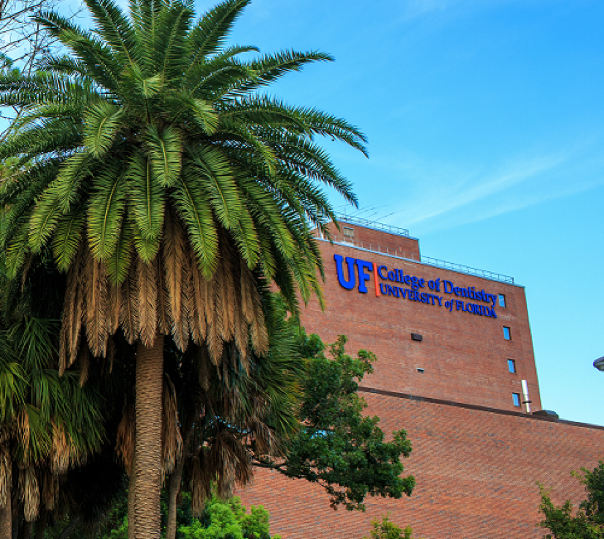
Research
- Dentistry’s research program received $17.1 million in grant funding with 89 percent of the total coming from federal sources. This represents a 10 percent increase over the previous year’s funding and the highest since fiscal year 2011.
- A recent analysis published in the Journal of Dental Research shows that UF is ranked fifth in NIH funding for U.S. dental schools over a span of 10 years (2005 to 2014).
- The college hired three outstanding faculty members under the UF Preeminence Initiative. Jorge-Frias Lopez, Ph.D., a microbiologist and bioinformatics expert focusing on the role that microbial communities play in human health and disease; Frank C. Gibson III, Ph.D., a macrophage biologist working on host-pathogen interactions; and Zsolt Toth, Ph.D., a virologist working on the epigenetics of oncogenic herpesvirus infections.
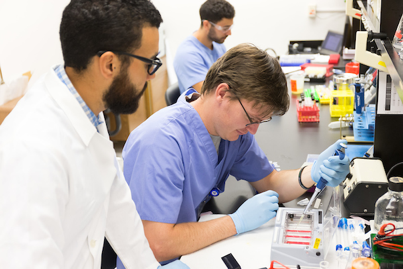 Faculty, residents and predoctoral students continue to receive top honors and awards for their efforts. Ann Progulske-Fox, Ph.D., was inducted as a member of the National Academy of Inventors. John Neubert, D.M.D., Ph.D., and Wellington Rody, D.D.S., M.S., both won national research awards from professional associations. Two advanced education residents won national research awards, and seven predoctoral students won national awards and honors or were selected for fellowships. Our staff efforts were recognized with five individuals winning Superior Accomplishment Awards for 2015-2016.
Faculty, residents and predoctoral students continue to receive top honors and awards for their efforts. Ann Progulske-Fox, Ph.D., was inducted as a member of the National Academy of Inventors. John Neubert, D.M.D., Ph.D., and Wellington Rody, D.D.S., M.S., both won national research awards from professional associations. Two advanced education residents won national research awards, and seven predoctoral students won national awards and honors or were selected for fellowships. Our staff efforts were recognized with five individuals winning Superior Accomplishment Awards for 2015-2016.
Faculty & Leadership
- The college hired 10 outstanding new faculty members. A new associate dean for faculty affairs, Shannon Wallet, Ph.D., was appointed — her efforts include further enhancement of collegewide programs for career development, orientation, mentoring and recognition programs for faculty.
- In 2016, the college maintained strong fiscal health through increased clinical revenue, a rise in grant funding, stable state funding for educational programs and mission-based budgeting.
- We are looking ahead to the future through the launch of a new UF Capital Campaign to ensure that the strategic needs of our college are supported through this valuable, universitywide effort toward preeminence in the nation.
College of Medicine
Dean: Michael L. Good, M.D.
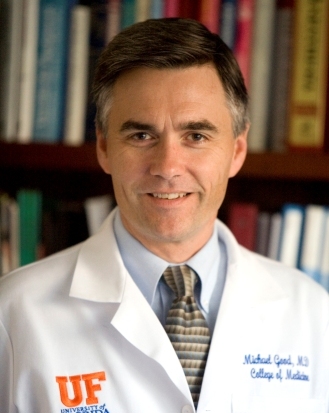 We proudly celebrated the 60th anniversary of the founding of the UF College of Medicine in 2016. Our celebrations culminated in September with a national deans’ panel discussion about the future of academic medicine and a special gala that highlighted the innovation and collaboration that has defined our college through the decades. These events, along with the recently published book “The University of Florida College of Medicine: A Legacy of Innovation and Collaboration Since the 1950s” (see http://alumni.med.ufl.edu/60thbook/) serve as reminders of our great history and of the many impressive individuals and teams responsible for important achievements in health, science and education.
We proudly celebrated the 60th anniversary of the founding of the UF College of Medicine in 2016. Our celebrations culminated in September with a national deans’ panel discussion about the future of academic medicine and a special gala that highlighted the innovation and collaboration that has defined our college through the decades. These events, along with the recently published book “The University of Florida College of Medicine: A Legacy of Innovation and Collaboration Since the 1950s” (see http://alumni.med.ufl.edu/60thbook/) serve as reminders of our great history and of the many impressive individuals and teams responsible for important achievements in health, science and education.
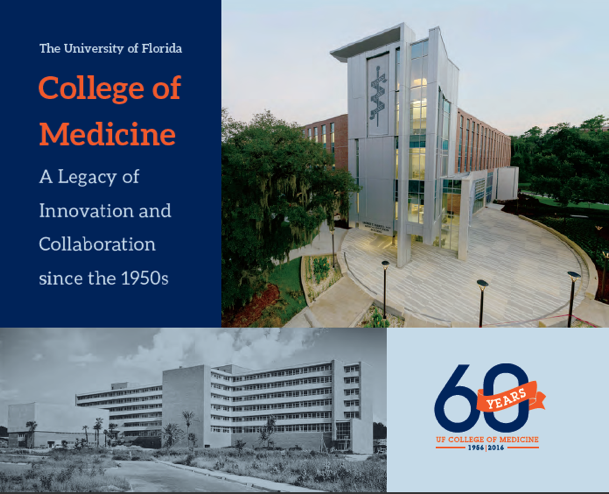
Clinical
2016 saw the fourth consecutive year of near-double-digit growth in our clinical visits. A characteristic that differentiates us from non-academic medical practices is that we are bimodal — providing the full spectrum of care to those in our local community, from preventive, to primary to tertiary — while serving as a medical care destination for patients who have unusual or extraordinary needs. To help reflect on the breadth of our clinical practice, consider the fact that during the year we saw a patient from every county in the state, and every state in the U.S., along with many foreign countries. Faculty-led care teams were recognized with “top 50” national rankings in eight adult and nine pediatric specialties, more than any other institution in the state, and more than most in the nation. In response to growth in our clinical mission, we successfully recruited leading physicians and staff to our practice and continued projects that will result in the addition of over 200,000 square feet of ambulatory space and over 500,000 square feet of much-needed inpatient facilities over the next 24 months.
Research
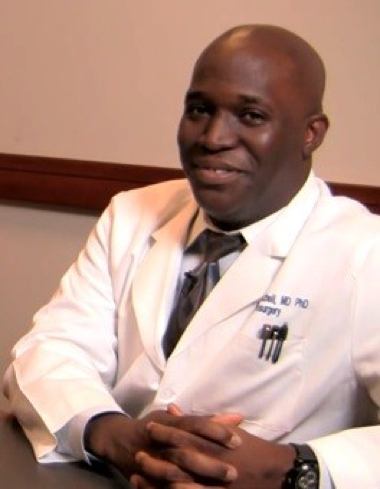 UF physicians and researchers continued to provide leadership in health care challenges that plague our nation and world. Funding to UF College of Medicine research faculty from the National Institutes of Health increased for the eighth consecutive year. Many notable projects were funded during the year. Researchers at the UF Institute for Therapeutic Innovation, led by Dr. George Drusano, received a National Institutes of Health program project grant to study tuberculosis therapies. Dr. Marco Pahor is leading an NIH coordinating center for clinical investigations on the molecular changes during physical activity in aging populations. Dr. David Tran received a Bankhead-Coley Cancer Research Program award to study triple negative breast cancer. Dr. Duane Mitchell was the recipient of a Hyundai Hope on Wheels award to further his research on immunotherapies for brain cancer.
UF physicians and researchers continued to provide leadership in health care challenges that plague our nation and world. Funding to UF College of Medicine research faculty from the National Institutes of Health increased for the eighth consecutive year. Many notable projects were funded during the year. Researchers at the UF Institute for Therapeutic Innovation, led by Dr. George Drusano, received a National Institutes of Health program project grant to study tuberculosis therapies. Dr. Marco Pahor is leading an NIH coordinating center for clinical investigations on the molecular changes during physical activity in aging populations. Dr. David Tran received a Bankhead-Coley Cancer Research Program award to study triple negative breast cancer. Dr. Duane Mitchell was the recipient of a Hyundai Hope on Wheels award to further his research on immunotherapies for brain cancer.
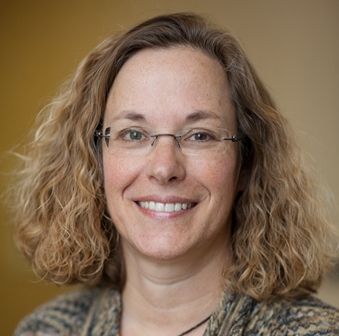 UF College of Medicine faculty continue to publish impactful articles and receive prestigious national and international awards. Laura Ranum was elected a fellow by the American Association for the Advancement of Science. Ira Longini was part of a team of Italian and American researchers who received the Aspen Institute Italia Award for scientific research and collaboration between Italy and the United States. Marty Cohn’s publication in Current Biology described how snakes lost their legs due to a trio of mutations in a genetic switch that controls the activity of a gene required for limb development.
UF College of Medicine faculty continue to publish impactful articles and receive prestigious national and international awards. Laura Ranum was elected a fellow by the American Association for the Advancement of Science. Ira Longini was part of a team of Italian and American researchers who received the Aspen Institute Italia Award for scientific research and collaboration between Italy and the United States. Marty Cohn’s publication in Current Biology described how snakes lost their legs due to a trio of mutations in a genetic switch that controls the activity of a gene required for limb development.
Education
There were many education accomplishments in 2016. We had another very successful Match Day, for both the outgoing match and the incoming match: 25% of our medical school graduates will complete their residency training at UF, 34% in the state of Florida, and 50% are entering designated primary care disciplines. The top five specialties for our medical school graduates are medicine, obstetrics and gynecology, emergency medicine, pediatrics, and family medicine. With the incoming match, 73% of the 180 new core trainees arrived from top 50 medical schools; 93% are graduates of U.S. schools.
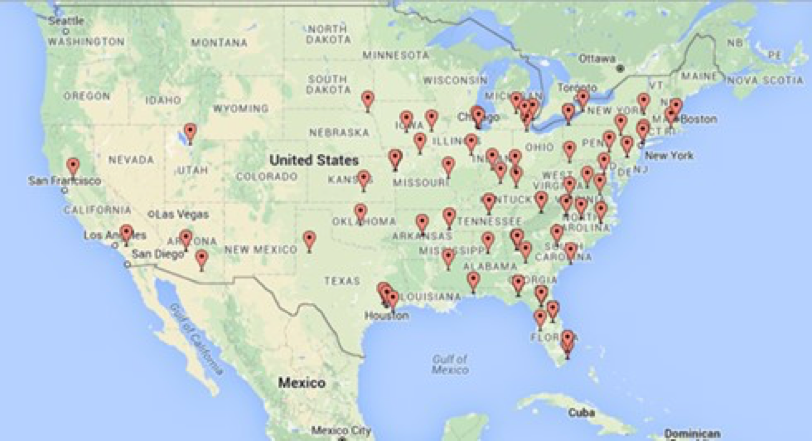
Our students are impressive. For example, Douglas Bennion received the Southern Medical Association Alliance Society 1924 Scholarship Award for his excellence in academics and leadership. Our graduate students were recognized with numerous university and International Center awards. The entire physician assistant program class of 2016 received the Outstanding Student Society Award from the American Academy of Physician Assistants.
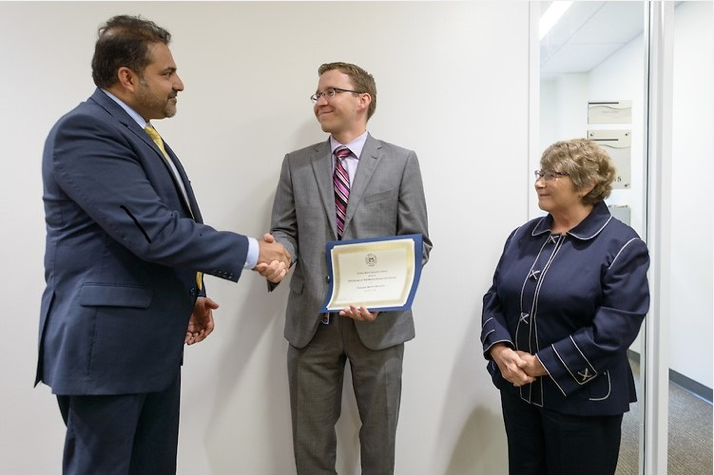
Advancing the graduate program is a key objective for UF and the UF Health Science Center as articulated in the Power of Together Strategic Plan and recommendations from the UF Health Graduate Education Committee. Dr. Joe Fantone is working with committee chair Dr. Henry Baker, Dr. Thomas Rowe, the basic science department chairs and other faculty to implement recommendations and achieve objectives. Progress to date includes renewed emphasis on recruiting the highest-quality graduate students; restructuring of the recruitment, acceptance and program marketing processes; and reorganization of the program concentrations toward department-based disciplines while promoting interdisciplinary research programs and education across the health colleges. This past year new certificate, master’s and doctoral concentrations in biomedical informatics were approved. Increasingly, certificate programs and online course offerings are being created and provided by UF College of Medicine faculty.
Faculty
The Office of Faculty Affairs and Professional Development oversaw the college promotion process, resulting in advancement of 18 faculty in the multi-mission track to associate professor, and six to full professor. Additionally, six faculty members were promoted to associate professor with tenure and 12 were promoted to full tenured professor. We administered and analyzed the AAMC Faculty Forward Engagement Survey to COM faculty achieving responses from 958 faculty (73% of total). Sixty-nine percent of respondents reported being satisfied or very satisfied with UF as a place to work, which was 10 points higher than a select peer group and 5 points higher than the average of all participating schools. UF also had a smaller proportion of faculty dissatisfied or very dissatisfied (10%) compared with peers and cohort. Findings from this survey were conveyed to chairs, departments and the Faculty Council, as well as through two Town Hall meetings. Efforts to address the major concerns, including benefits, mentoring and advancement, are ongoing. The office continues to support individual faculty members participating in internal and extramural leadership programs, local programs for women faculty, and social gatherings of faculty. The Faculty Matters newsletter and the Virtual Faculty Clubs continue to be positively received by college faculty. Improvement of structured onboarding processes for faculty and a separate process for new department chairs continues to evolve.
Calendar year 2016 was one of transition for the college’s finance and administration team. Upon the retirement of Wayne Tharp and Jan Eller, who each served the college for more than three decades, the college consolidated the offices of finance and HR into one directorate. The consolidation has already resulted in significant cost savings, and positions the human resources team closer to its faculty and staff customer base. The clinical enterprise increased its core collections to $326 million. Additionally, the College of Medicine in Gainesville saw a record number of faculty at 1,356 at the conclusion of 2016.
Exciting days lie ahead. In 2017, we will open the new UF Health Neuromedicine Hospital and Heart & Vascular Hospital towers. Florida’s population and health care needs will continue to grow. Our UF College of Medicine faculty will be front and center as the community, state, nation and world tackle new diseases, forge new health policy and continually work to improve human health.
College of Medicine-Jacksonville
George R. Wilson, M.D., Senior Associate Dean for Clinical Affairs
Introduction
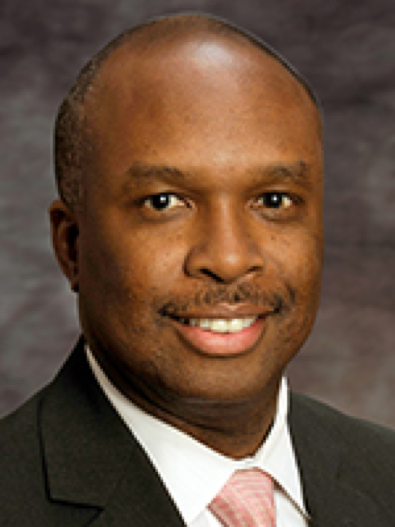 At the beginning of calendar year 2016, Dr. Daniel Wilson announced that he was leaving his position as dean of the College of Medicine – Jacksonville and had accepted the position of president, Western University, Pomona, California. Drs. George Wilson, Guy Benrubi and Linda Edwards were appointed by Dr. Guzick as a triad of associate deans who would manage faculty affairs while a search for a new dean was conducted. Dr. David Vukich chaired a search committee consisting of faculty, hospital leadership and hospital board members. An exhaustive national search led to the identification of three finalists, who underwent further interviews. On Sept. 29, 2016, Dr. Guzick announced that the new dean would be Leon L. Haley, M.D., MHSA, FACEP, C.P.E., a professor of emergency medicine at Emory who had served in the roles of chief medical officer, Emory Medical Care Foundation and Emory executive associate dean for clinical services for Grady Memorial Hospital. Dr. Haley assumed his new position as dean of the College of Medicine – Jacksonville on Jan. 4, 2017.
At the beginning of calendar year 2016, Dr. Daniel Wilson announced that he was leaving his position as dean of the College of Medicine – Jacksonville and had accepted the position of president, Western University, Pomona, California. Drs. George Wilson, Guy Benrubi and Linda Edwards were appointed by Dr. Guzick as a triad of associate deans who would manage faculty affairs while a search for a new dean was conducted. Dr. David Vukich chaired a search committee consisting of faculty, hospital leadership and hospital board members. An exhaustive national search led to the identification of three finalists, who underwent further interviews. On Sept. 29, 2016, Dr. Guzick announced that the new dean would be Leon L. Haley, M.D., MHSA, FACEP, C.P.E., a professor of emergency medicine at Emory who had served in the roles of chief medical officer, Emory Medical Care Foundation and Emory executive associate dean for clinical services for Grady Memorial Hospital. Dr. Haley assumed his new position as dean of the College of Medicine – Jacksonville on Jan. 4, 2017.
Education
The education programs continue to excel. The College of Medicine – Jacksonville has 296 residents and 73 fellows in accredited programs in 12 clinical departments and an additional seven fellows in clinical non-accredited programs. All programs are currently accredited and the campus has been successful in incorporating the ACGME model for training oversight (“Next Accreditation System”). The Office of Educational Affairs has fully implemented new requirements for annual program reviews via the Committee on Annual Program Evaluation Review.
The University of Florida College of Medicine continues to incorporate the Jacksonville campus as a training site for its MS3 and MS4 students, with 30% of medical students completing clinical rotations in Jacksonville. For 2016 this was accomplished via 460 MS3 rotations, 155 MS4 rotations and 106 PA student rotations. In addition, the college hosted 189 non-UF College of Medicine MS4 students during the year. With both UF Nursing and Pharmacy students on the Jacksonville campus as well, the educational experience and opportunity for multidisciplinary training is exceptional.
The College of Medicine – Jacksonville’s long-standing program for training faculty to be excellent teachers continues through faculty development seminars that focus on faculty skills in student evaluation, feedback and teaching in an environment with limited flexible and discretionary time.
Faculty
At present there are a total of 396 faculty with openings for an additional 11 positions for which there is active recruitment. Current faculty include 258 assistant professors, 72 associate professors and 30 full professors on the multi-mission track, three assistant professors, seven associate professors and 23 full professors on the tenure track and one each of research assistant professor, research associate professor and assistant scientist.
In July 2016 the UF College of Medicine – Jacksonville promoted two faculty members to clinical professor and six faculty members to clinical associate professor.
Practice Plan (University of Florida Jacksonville Physicians Inc.)
During this calendar year the Academic Practice Plan at the UF College of Medicine – Jacksonville undertook a reorganization, eliminating one of several corporate entities and merging many of its functions into University of Florida Jacksonville Physicians Inc., thus eliminating and streamlining many administrative functions. The practice plan finished FY2016 with a positive bottom line of $6.4 million, faculty bonuses and incentives were paid at 100% of earned amounts, and support staff were given bonuses after a transfer of $2.8 million was made to reserves.
Payor mix, which is always a challenge in Jacksonville, continues to improve, with a 30.5 percent increase in commercial-pay patients over the previous two years. While this is due, in part, to the UF Health North campus, it is also reflected in volumes on the main 8th Street campus and the Emerson Street campus. In all venues, this trend has been sustained over the last several years.
There continues to be very positive movement in implementing and using the various modules of EPIC. Specifics include Healthy Planet (population management application), Tapestry (managed care application) and Beaker (laboratory data management application). These have all been implemented during this past year and, by providing our campus an integrated system, it puts us in a very good position to compete with other health care systems in our community that are not fully integrated. One feature, the “MyChart” program, has been a big “winner” with patients, providing access and information via the internet. To date, 47,450 unique patients have signed up for, and are actively using, this tool. Comments are consistently very positive.
Research
The College of Medicine – Jacksonville continues to grow its research activities. In January 2016, biostatistician Dr. Dale Kraemer, who had been with us for the past six years, retired. A search for a replacement was initiated by Dr. Dan Wilson and a replacement was hired during the late summer. Dr. Shiva Gautam came from Harvard and is providing excellent biostatistical analyses for the campus. The position of associate dean for research is currently open; with the arrival of Dean Haley, it is expected this position will be filled in the near future.
For calendar year 2016, total funding via all contracts and grants was $14.3 million. Of this, $11.4 million came through the Department of Pediatrics and $2.1 million came through the Department of Internal Medicine. The remaining $831,993 came from a wide range of other departments.
Clinical Services
In December 2016 the UF Board of Trustees approved establishing a Department of Urology on the College of Medicine – Jacksonville. This will require moving the Division of Urology out of the Department of Surgery, which will occur in early calendar year 2017. A search for a chair will be initiated immediately and an interim chair will be named while the search is ongoing.
In early 2016, a skull-based tumor referral service, which is very innovative and unique, was established. The service is offered to a geographic area extending into Southern Georgia, North Central Florida and Southeast Florida. This service is unique in that it is multidisciplinary, including Neurosurgery, Oral Maxillofacial Surgery, ENT, Radiology, Radiation Oncology and Proton Therapy. No other health care system in the Southeast has all these services under one organizational model.
Clinical volumes continue to grow at UF Health North, at the main campus, the Emerson extension and the widely dispersed primary care system. The College of Medicine – Jacksonville primary care network provides access to faculty physicians in over five Northeast Florida counties and two Southeast Georgia counties. This system makes the college very competitive in Northeast Florida for managed care and managed risk contracts as it allows easy access to patients over more than 1,400 square miles in Southeast Georgia and 3,200 square miles in Northeast Florida.
For calendar year 2016, excluding the North campus, total ambulatory volume for the College of Medicine – Jacksonville was 590,605 clinical visits. Of these visits, 328,085 were performed in the Community Health and Family Medicine primary care network, with an additional 11,927 primary care visits performed by General Internal Medicine. The next three highest-volume departments were OB/GYN (47,090), Internal Medicine (39,712, excluding primary care) and Pediatrics (33,948).
UF Health North
The UF Health North campus is a faculty practice model that has experienced continuous, excellent growth.
The medical office building at the UF Health North campus is completely occupied with all College of Medicine – Jacksonville services being provided at that site, other than Ophthalmology and Psychiatry. During this year, growth at that campus has been consistent, and we finished the year with clinical visits at 31.8 percent above projections, fueling the improvement in overall payor mix noted above. A number of programs that initially shared space with other services when the Medical Office Building opened outgrew their original shared space and moved into larger, single-service, spaces. These included Obstetrics/Gynecology, Oral Maxillofacial Surgery, Neurosciences (Neurology/Neurosurgery), Occupational Medicine and Orthopedics. These expansions will position all of these services to increase access exponentially once the UF Health North bed tower opens in May 2017.
Ambulatory volumes at the North Medical Office Building totaled 36,559 visits during calendar year 2016. This included 3,092 internal medicine primary care visits and 1,974 pediatric primary care visits. The three highest-performing specialty clinics were Cardiology (4,461), Orthopedics (3,906) and Gastroenterology (3,067).
Expansion of College of Medicine – Jacksonville services at North have huge benefits for the UF Health North hospital and the entire UF academic health center in Jacksonville. With inpatient services at UF Health North expected to open in May 2017, cardiology will begin performing diagnostic and interventional procedures, neurosurgery will initiate its neck and spine service line, orthopedics will add hand and joint surgery and expand sports medicine services, OB/GYN will begin its inpatient obstetric and gynecologic services and expand its current minimally invasive service (inclusive of same-day discharges of total abdominal hysterectomies), and surgery will expand ENT, general surgery and colorectal services.
The future for the UF College of Medicine – Jacksonville looks especially bright.
College of Nursing
Dean: Anna M. McDaniel, Ph.D., R.N., FAAN
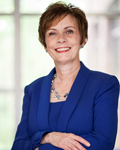 The College of Nursing celebrated 60 years of excellence in nursing education, research and leadership in 2016 and honored the many ways our faculty, students and alumni “care, lead and inspire.” Our yearlong celebration included spotlighting 60 of our outstanding alumni who personify our tri-part motto. Capped off in the fall with a joint barbecue celebration with the College of Medicine and various college celebrations, we enjoyed honoring our rich heritage and looking forward to the future.
The College of Nursing celebrated 60 years of excellence in nursing education, research and leadership in 2016 and honored the many ways our faculty, students and alumni “care, lead and inspire.” Our yearlong celebration included spotlighting 60 of our outstanding alumni who personify our tri-part motto. Capped off in the fall with a joint barbecue celebration with the College of Medicine and various college celebrations, we enjoyed honoring our rich heritage and looking forward to the future.
The College is now in its third year of our current strategic plan to achieve our vision to “be a model of excellence, recognized nationally and internationally for innovative education, dynamic program of research and creative approaches to practice.”
Administration/Operations
In 2016, the college embarked on several initiatives to bolster future success across our missions. The faculty organization revised faculty bylaws and our governance structure to make faculty responsibilities more efficient and inclusive to enable faculty to “do the work that only faculty can do.” The college also enhanced services of the Office of Student Affairs, which included initiating a business process analysis, redesigning the student information system, implementing a centralized application service and partnering with UF’s Career Resource Center. We also improved our student success measures by increasing peer tutoring and student referral services.
The college increased its commitment to diversity and inclusion by hosting a series of quarterly diversity dialogues under the leadership of a faculty and staff diversity task force. The result of the yearlong development process was to appoint a director of diversity and inclusion. The director — associate professor Jeanne-Marie Stacciarini — has worked to put establish a formal community-based advisory board to address these vital issues. This board consists of faculty, staff, students, alumni and community members.
Finally, the college had a successful fundraising year by meeting our annual goal of $2.2 million and establishing the Linda Harman Aiken Professorship in honor of one of our most esteemed alumna. Dean Anna McDaniel was named to the Aiken Professorship. This year, the college doubled the scholarship funding for students from private donors to over a half-million dollars. The college continued to raise the visibility of the excellence and expertise of our faculty and students. Currently, more than 25 percent of faculty members are fellows of the American Academy of Nursing, one of the highest levels among nursing schools nationally.
Education
In our educational mission, admission remains competitive and we have robust enrollment in all programs. Enrollment on average across our programs (Bachelor of Science in Nursing, Doctor of Nursing Practice and Ph.D. in Nursing Science) increased 43 percent. The DNP program was ranked by U.S. News & World Report as the top-ranked program in the state of Florida and among the top 25 public nursing schools.
We had a successful accreditation visit for our DNP program with no recommendations. We expect our final report in the spring, when we can announce our official reaccreditation. The site visit team acknowledged the success of our newly streamlined DNP curriculum instituted to ensure we are meeting today’s health care needs while maximizing the experiences for our advanced practice students.
The college initiated its Accelerated BSN program in Jacksonville with a very competitive admissions process and expects to double the number of students in the upcoming year. To continue our commitment to diversity and inclusion in our educational mission, an innovative program titled EMBRACE was implemented to enhance BSN student engagement in research and service among students from underrepresented groups. The college was also an active part of a successful $415,000 grant submission to the Robert Wood Johnson Foundation to institute the 2017 Summer Health Professions Education Program, or SHPEP. The program — encompassing all six health science colleges — will enable 80 underrepresented and minority students to take part in the free six-week summer residential program at UF designed to facilitate interest in, successful application to and matriculation into health professions education.
Finally, the college’s commitment to quality education was evidenced in a concerted faculty development effort around the latest in teaching pedagogy. The voluntary program was based on the National League for Nursing’s Certified Nursing Educator curriculum, which recognizes excellence in the advanced specialty role of the academic nurse educator. A group of College of Nursing faculty coordinated a workgroup to prepare for the certification exam and met weekly in the evenings for three months to discuss philosophies and strategies. Several faculty members have already been certified. Their leadership not only benefits our students but also encourages faculty members to enhance our evidence-based teaching.
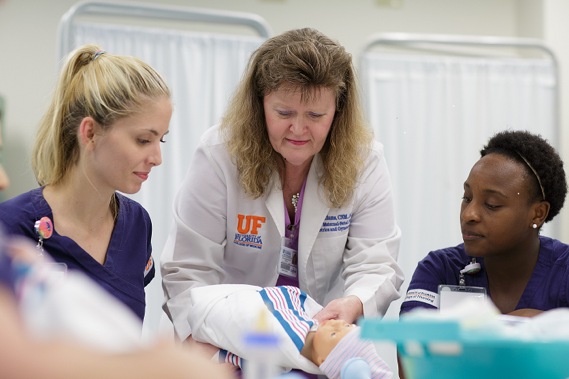
Research
In our research mission, our NIH funding increased by 81 percent over the last three years. Our scholarship metrics are at or above the 75th percentile nationally. Dr. Diana Wilkie, an internationally recognized cancer pain researcher and the Prairieview Trust-Earl and Margo Powers Endowed Professor, is leading the efforts to establish the Academic Center of Excellence for Palliative Care Research & Education, or ACE PACaRe, housed within the College of Nursing. Dr. Wilkie is the principal investigator on a five-year $3 million grant from the National Cancer Institute and the National Institute for Nursing Research that will fund a study focusing on dignity therapy and palliative care, which will take place at six sites across the country, including Northwestern University, Emory, University of California-San Francisco and MD Anderson Cancer Center.
We continue to build a critical mass of research in priority areas for UF and have strengthened our cross-disciplinary collaborations with areas such as the Clinical and Translational Science Institute, the Institute on Aging, the UF Health Cancer Center, PRICE (pain research), Biomedical Informatics and the Institute for Latin American Studies. We strengthened our commitment to scholarship across our faculty, building teams of tenure and clinical track faculty for projects and publications.
Practice
Progress in our clinical mission has included our strong partnership with UF Health and new clinical faculty appointments. As part of UF Health, the College of Nursing is more closely integrated with the health system’s clinical mission in order to strengthen the link between education and practice. We embarked on a joint retreat with UF Health Shands and UF Health Jacksonville nursing leadership to identify shared goals and initiatives. A shared vision statement was developed with leadership to reflect shared values and missions.
The college increased its number of faculty members with practice appointments including within our UF Health system and our own nurse-managed clinic and other clinical agencies.
Archer Family Health Care remains one of the premiere nurse-managed clinics in the country. AFHC has demonstrated excellent quality metrics across the spectrum, including preventive care, patient education, immunization rate and clinical indicators. The nurse-led interprofessional care team model to improve outcomes, increase patient satisfaction and decrease costs has become a national model. The project includes mental health services, the addition of pharmacy services and a nursing case manager.
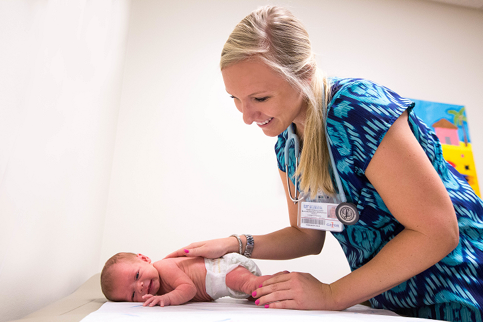 Our undergraduate students and community health nursing faculty continue to have a direct impact on health promotion in our local areas — providing more than 17,000 hours of service in fiscal year 2016. Community health faculty members and students provide health screenings and education and serve as a vital link between the primary care setting and families in the community. This includes our undergraduate students and faculty playing a major part in the Control Immunity countywide project to immunize school-age children and protect our community from the flu.
Our undergraduate students and community health nursing faculty continue to have a direct impact on health promotion in our local areas — providing more than 17,000 hours of service in fiscal year 2016. Community health faculty members and students provide health screenings and education and serve as a vital link between the primary care setting and families in the community. This includes our undergraduate students and faculty playing a major part in the Control Immunity countywide project to immunize school-age children and protect our community from the flu.
College of Pharmacy
Dean: Julie A. Johnson, Pharm.D.
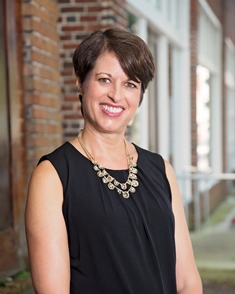 In 2016, the University of Florida College of Pharmacy continued its rise to the top of the U.S. News & World Report national rankings. UF moved to No. 9 nationally among 125 pharmacy colleges included in the latest rankings. The top 10 placement puts UF in elite company among the upper echelon of pharmacy colleges in the country and reflects the collective efforts of many college leadership, faculty, staff and students who support the college’s education, research and clinical missions.
In 2016, the University of Florida College of Pharmacy continued its rise to the top of the U.S. News & World Report national rankings. UF moved to No. 9 nationally among 125 pharmacy colleges included in the latest rankings. The top 10 placement puts UF in elite company among the upper echelon of pharmacy colleges in the country and reflects the collective efforts of many college leadership, faculty, staff and students who support the college’s education, research and clinical missions.
Education
Students in the Doctor of Pharmacy program continued to embrace the college’s new curriculum in 2016. With the successful implementation of the first year-and-a-half of the curriculum, interdisciplinary faculty teams are teaching the next generation of pharmacists using team-based learning strategies that emphasize patient-centered care. New active learning spaces that are designed for team-based learning are now in place on the Gainesville, Jacksonville and Orlando campuses. These new active learning spaces also have state-of-art videoconferencing technology and, as a result, teaching across the three campuses is now synchronous. The new co-curriculum is also providing students with skills to enhance self-awareness, interpersonal communication, advocacy and leadership.
In 2016, 299 graduates were awarded the Doctor of Pharmacy degree. The college led the nations with placement of students into a residency when 95 students matched into a postgraduate residency. In addition, two of the college’s own residency programs, ambulatory care and pharmacogenetics, were granted the maximum six-year accreditation by the American Society of Health-System Pharmacists in 2016. The residency in Pharmacogenetics is only the second such residency in the country.
The College of Pharmacy also serves as fertile training ground for future pharmaceutical scientists. More than 40 graduate faculty provide mentorship and training to 99 Ph.D. and residential M.S. students who have the opportunity to participate in leading-edge research and take a lead role in advancing science. In 2016, nine Ph.D. degrees and five M.S. degrees were awarded by the residential graduate program and 228 M.S. degrees were awarded through the online programs based in the college.
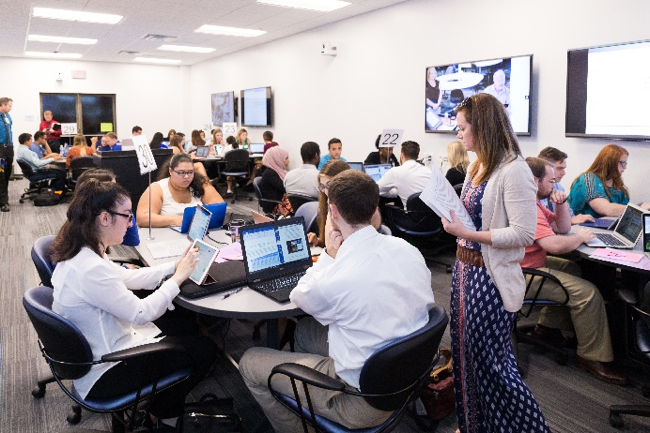
Professional and graduate students in the UF College of Pharmacy continue to earn recognition for their outstanding educational accomplishments and their commitment to improve their university and larger communities. A few notable recognitions in 2016 included:
- The American Association of Colleges of Pharmacy awarded the UF College of Pharmacy one of four national Student Community Engaged Service Awards
- The American Society of Health-System Pharmacists awarded a national Outstanding Professional Development Award to the Gainesville student chapter of the Florida Society of Health-System Pharmacists.
- Emilie Bergsma, a third-year student from the Gainesville campus, was one of 11 students nationally to receive an American Society of Health-System Pharmacists’ Student Leadership Award.
- Trey Burry, a third-year student from the Gainesville campus, was selected as one of eight junior members to serve on the National Community Pharmacists Association Student Leadership Council.
- Jessica Rodiles, a fourth-year pharmacy student from the Gainesville campus, was elected to serve on the International Pharmaceutical Students’ Federation’s Executive Committee.
- Allyssa Webb, a third-year pharmacy student at the St. Petersburg campus, was appointed to serve on the American Society of Health-System Pharmacists Pharmacy Student Forum Leadership Development Advisory Group.
- Graduate students Gena Burch, Pharm.D., and Amelia Deitchman, Pharm.D., received fellowship awards from the American Foundation for Pharmaceutical Education.
- Abdullah Alalwan, Pharm.D.; Nakyung Jeon; Johannes Kast; Oyunbileg Magvanjav; Ana Caroline Sá; Sonja Hartmann, Ph.D.; and Mohamed Shahin, Ph.D., all won awards for their research at various national and international scientific conferences.
The College of Pharmacy’s online graduate programs continue to serve working professionals in a significant way. These programs provide access to the University of Florida to those who would otherwise be unable to attend. Examples include working professionals, parents with young children or family members needing care, those with disabilities and those with geographic constraints. With 30 percent of students being under-represented minorities, and students from 40 countries, we have extended the reach of UF well beyond its typical student body. The college also supports online programs from the colleges of Medicine and Veterinary Medicine, as well as providing support of major grants that require an outreach component.
Research
The College of Pharmacy enjoyed another stellar year in research activities and funding. In the 2016 calendar year, the college secured a record $12.7 million from federal, state, corporate and foundation sources. Faculty led a total of 102 funded projects, including 46 new awards. At a time when many colleges and universities are struggling to maintain existing funding levels, especially among federal sources, the College of Pharmacy has experienced remarkable growth. This year faculty in the college brought in more than $9 million in federal funding compared with only $6 million in 2012. Notable research findings included:
- Larissa Cavallari, Pharm.D., an associate professor and director of the Center for Pharmacogenomics, presented research at a high-profile session at the American Heart Association’s Scientific Sessions that showed a genetic test can help reduce the risk of cardiovascular events by guiding antiplatelet drug therapy after percutaneous coronary intervention. The test identifies a genetic deficiency that affects the body’s ability to activate clopidogrel, a common antiplatelet drug given after a coronary artery stent is inserted. The national collaborative project of nearly 2,000 patients from seven institutions across the U.S. confirmed UF Health’s previous findings that genetically guided therapy reduced the percentage of deaths, heart attacks or strokes by nearly half compared with those who were prescribed clopidogrel. The findings may lead other institutions to adopt genotype-guided therapy as common practice in coronary angioplasty procedures.
- Almut Winterstein, Ph.D., a professor and chair of pharmaceutical outcomes and policy, published research in the journal Pediatrics that found no evidence that children taking the attention-deficit hyperactivity disorder drug atomoxetine were at an increased risk of suicide or suicide attempts, despite a black box warning from the Food and Drug Administration. Winterstein’s research team studied a half-million children with ADHD in 26 states for four years and found no increased risk of suicide attempts among 5- to 18-year-olds treated with atomoxetine compared with those receiving stimulant treatment.
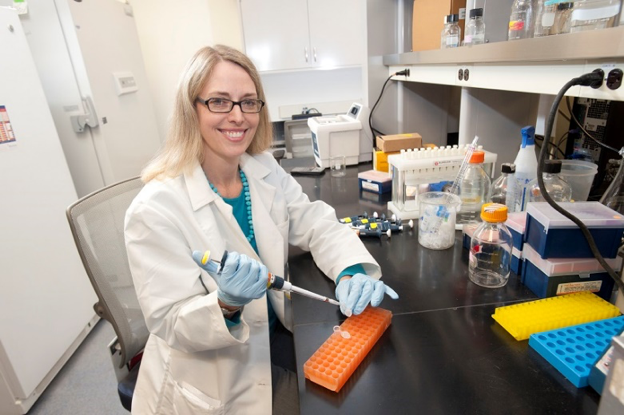
Clinical
Pharmacists in the UF College of Pharmacy are identifying innovative ways to advance clinical pharmacy practice as well as improve access for patients receiving primary care services. Innovative interdisciplinary and collaborative practice agreements have positioned the College of Pharmacy as a national leader in the development and evaluation of unique clinical pharmacy practice models. The shared-responsibility model between the College of Pharmacy and the UF Health Pharmacy Department partners clinical pharmacists with academic clinicians to strengthen the education of future pharmacists and increase scholarly activity. In 2016, the partnership with UF Health expanded to include teams in infectious disease, critical care and pediatrics.
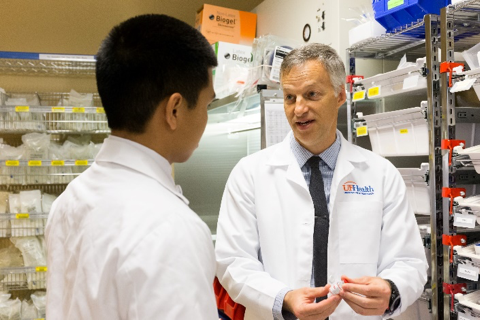
The College of Pharmacy’s Medication Management Center, or MMC, further secured its place in 2016 as the nation’s largest academically owned medication therapy management center. The center, with locations in Gainesville and Orlando, supports Medicaid and Medicare recipients by providing comprehensive medication reviews, adherence interventions and other telephonic outreach services to 450,000 unique patients a year. The MMC team has grown from 12 full-time employees in 2012 to more than 120 today. The center supports the college’s research and education missions by hosting a residency program and pharmacy students completing clinical rotations. The accomplishments of the MMC were profiled in the July 2016 “On the Same Page” (https://ufhealth.org/news/2016/expertise-and-entrepreneurship-college-pharmacy).
Faculty and Leadership
Faculty in the College of Pharmacy continued a tradition of excellence in scholarship, research and education in 2016. The college added 18 new faculty members. These include Chengguo Xing, Ph.D., a professor of medicinal chemistry and the Frank A. Duckworth Eminent Scholar Chair in Drug Research and Development, and Chenglong Li, Ph.D., a professor of medicinal chemistry and the Nicholas Bodor Professor in Drug Discovery, hired as part UF’s Preeminence initiative in Drug Discovery and Development.
A national search for a new associate dean of student affairs brought Shauna Buring, Pharm.D., to the position from the University of Cincinnati. Buring leads a highly innovative and effective student affairs office that includes all elements of student affairs, from recruitment and admissions through graduation.
College of Pharmacy faculty were recognized with many national and international awards in 2016. These honors were well-deserved and reflect upon the outstanding scholars and educators at the college. A few of the many faculty honors included:
- Rhonda Cooper-DeHoff, Pharm.D., M.S., an associate professor of pharmacotherapy and translational research, was presented with the Russell R. Miller award at the American College of Clinical Pharmacy’s Annual Meeting.
- Julie Johnson, Pharm.D., dean and distinguished professor, was honored with the American Association of Colleges of Pharmacy’s Volwiler Research Achievement Award, the nation’s top academic pharmacy research honor. In addition, Johnson was named as one of Thomson Reuters’ Highly Cited Researchers of 2016.
- Folakemi Odedina, Ph.D., a professor of pharmacotherapy and translational research, was awarded a 2016 Inspiring Women in STEM Award by INSIGHT Into Diversity magazine.
- Stephan Schmidt, Ph.D., an assistant professor of pharmaceutics, was awarded the 2016 Tanabe Young Investigator Award by the American College of Clinical Pharmacology.
- Thomas Schmittgen, Ph.D., a professor of pharmaceutics, was elected a fellow of the American Association of Pharmaceutical Scientists.
- Stacy Voils, Pharm.D., a clinical associate professor of pharmacotherapy and translational research, was named a fellow of the American College of Clinical Pharmacy.
- Kristin Weitzel, Pharm.D., a clinical associate professor, was named editor-in-chief of Pharmacy Today, an official publication of the American Pharmacists Association.
College of Public Health and Health Professions
Dean: Michael G. Perri, Ph.D.
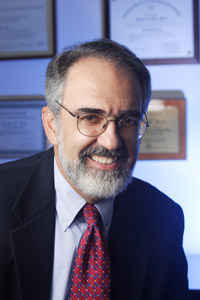 We are pleased to start the new year by welcoming Sherrilene Classen, Ph.D., M.P.H., back to UF as the chair of the department of occupational therapy. An internationally recognized scientist in driving rehabilitation, she most recently served as a professor and director of the School of Occupational Therapy at Western University in London, Ontario, Canada. In addition, we have hired two more faculty members under UF’s preeminence initiative. Jinying Zhao, Ph.D., joins the department of epidemiology in PHHP and the College of Medicine from Tulane University, in the area of genomics. As the principal investigator on four NIH-funded grants, Dr. Zhao explores the interplay of genes and environment and how they contribute to some of the most serious and complex diseases, including Alzheimer’s, depression, diabetes, heart disease and obesity. Russell Hepple, Ph.D., joins the department of physical therapy from McGill University, in the area of skeletal muscle biology. Dr. Hepple studies muscle deterioration with age and his research can increase our understanding of how older adults can maintain fitness and physical function as they age.
We are pleased to start the new year by welcoming Sherrilene Classen, Ph.D., M.P.H., back to UF as the chair of the department of occupational therapy. An internationally recognized scientist in driving rehabilitation, she most recently served as a professor and director of the School of Occupational Therapy at Western University in London, Ontario, Canada. In addition, we have hired two more faculty members under UF’s preeminence initiative. Jinying Zhao, Ph.D., joins the department of epidemiology in PHHP and the College of Medicine from Tulane University, in the area of genomics. As the principal investigator on four NIH-funded grants, Dr. Zhao explores the interplay of genes and environment and how they contribute to some of the most serious and complex diseases, including Alzheimer’s, depression, diabetes, heart disease and obesity. Russell Hepple, Ph.D., joins the department of physical therapy from McGill University, in the area of skeletal muscle biology. Dr. Hepple studies muscle deterioration with age and his research can increase our understanding of how older adults can maintain fitness and physical function as they age.
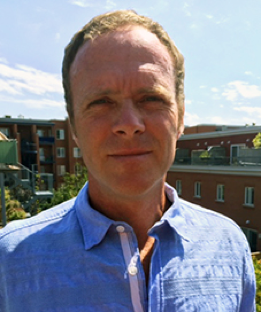
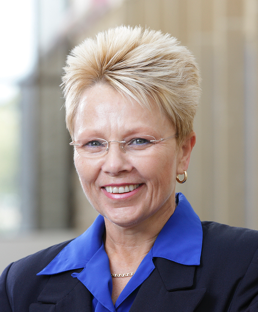
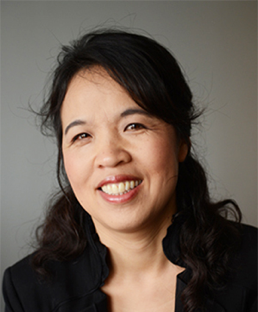
Research
The college continues to climb in NIH funding among peer schools and is ranked 12th in NIH funding among the 57 accredited U.S. schools of public health, based on the most recent data available. Total grant funding increased from $26.1 million to $30 million, and awards from NIH rose from $16 million to $21 million.
PHHP faculty members are working on research projects close to home and in countries throughout the world on a diverse range of topics with real-world impact. Some highlights of their accomplishments include:
- Ira Longini, Ph.D., a professor in the department of biostatistics in PHHP and the College of Medicine, played an integral role in the design and analysis of the WHO Ebola vaccine trial in Guinea. In final findings published last month in The Lancet, the team reported the vaccine is 100 percent effective at preventing Ebola when given 10 or more days prior to exposure to the virus.
- Duchenne muscular dystrophy research by Krista Vandenborne, Ph.D., chair of the department of physical therapy, and her team appeared as the cover article of the April issue of the Annals of Neurology. Dr. Vandenborne and her colleagues use MRI technology to track the progression of the disease and offer rapid feedback on the effects of new therapies in clinical trials.
- Co-principal investigators Linda B. Cottler, Ph.D., M.P.H., chair of the department of epidemiology, and Sara Jo Nixon, Ph.D., a professor of psychiatry and psychology and chief of the division of addiction research in the College of Medicine’s department of psychiatry, launched Gainesville recruitment for the Adolescent Brain Cognitive Development, or ABCD, study. Funded by the NIH, the ABCD study will follow the biological and behavioral development of 10,000 children recruited from sites around the country.
- A study co-authored by Cynthia Johnson, Ph.D., an associate professor of clinical and health psychology and a member of the Anita Zucker Center for Excellence in Early Childhood Studies, was recognized as one of the top breakthroughs in autism research by the Interagency Autism Coordinating Committee. The multisite trial examined a training program for parents of children with autism spectrum disorders. Researchers found the program reduced children’s serious behavior problems by nearly 70 percent.
- The college was awarded a nearly $10 million grant from the Centers for Disease Control and Prevention through the National Institute of Occupational Safety and Health to establish the Southeastern and Coastal Center for Agricultural Safety and Health. Led by principal investigator J. Glenn Morris, M.D., M.P.H., director of the Emerging Pathogens Institute, the center’s researchers, including Andrew Kane, Ph.D., an associate professor in the PHHP department of environmental and global health, will explore the occupational safety and health of people working in agriculture, fishing and forestry in Florida, Georgia, Alabama, Mississippi and North and South Carolina.
- Adam Woods, Ph.D.; Ronald Cohen, Ph.D.; and Michael Marsiske, Ph.D., faculty members in the department of clinical and health psychology, received a five-year, $5.7 million grant from the National Institute on Aging to study whether cognitive training paired with electrical stimulation to the brain can improve cognitive functioning in older adults.
Teaching
The college has grown its educational portfolio with an array of important, high-quality offerings. In March, the college received approval from the Florida Board of Governors to offer a bachelor’s degree in public health. The first class of students began the program in the fall. The college has also added two online programs that will launch in fall 2017: a master’s degree in biostatistics and a master’s degree in One Health.
The Doctor of Physical Therapy program moved into the top 10 of physical therapy education programs nationwide in the latest U.S. News & World Report rankings. Among AAU public universities, they rank third.
A team composed of PHHP students including Carolina De La Rosa Mateo, a bachelor’s of health science student, and Karen Restrepo, a master’s in public health student, along with Jordan Mullings, a master’s in business administration student, earned first place at the national CLARION student case competition. The competition asks teams of students from different disciplines to work together to analyze a complex health care case and create a root cause analysis.
PHHP continues to lead in the use of blended learning, a combination of online/virtual content and in-person content designed to enhance student learning. The college now has 101 courses that incorporate some element of blended learning.
Service
PHHP has continued its commitment to provide health services and health promotion activities to individuals and communities. Clinicians in the college’s speech, hearing and clinical psychology services provided more than 50,000 patient visits. New patient services in 2016 include a program at the UF Health Speech & Audiology Center – Shands Hospital that offers listening and spoken language intervention to children who are deaf or hard of hearing and their families. In addition, Glenn Smith, Ph.D., the chair of the department of clinical and health psychology, launched his Healthy Action to Benefit Independence and Thinking, a 10-day, 50-hour intensive program for people with mild cognitive impairment and their partners.
Other service activities include:
- HealthStreet, a community engagement program supported by PHHP, the College of Medicine and CTSI, expanded its community health worker model to the Miami area to provide referrals to older adults for medical and social services and Alzheimer’s disease research opportunities at Mount Sinai Medical Center.
- Students in physical therapy, occupational therapy and clinical and health psychology offer pro bono services through Equal Access Clinics.
- Audiology faculty and students celebrated the 13th anniversary of Project Yucatan. Throughout the years, the team has screened 12,000 Yucatan residents and provided thousands of hearing aids and hearing aid batteries. They partner with the local nonprofit Asociacion Yucateca Pro Dificiente Auditivo to provide follow-up hearing health care during the rest of the year.
- Three PHHP employees received Superior Accomplishment Awards at the university level in 2016, more than any other college. Brenda Wiens, Ph.D., a clinical assistant professor in the department of clinical and health psychology, took on extra patient care and student mentoring duties following the sudden passing of a fellow faculty member. John Anderson, a research coordinator in the department of environmental and global health, coordinated a large and complex research project in Kisumu, Kenya targeting improved sanitation. Stephanie McBride, a conference and event planner in the dean’s office, managed a massive office and lab space move that affected more than 100 college faculty, staff and students in four buildings.
College of Veterinary Medicine
Dean: James W. Lloyd, D.V.M., Ph.D.
 Administration
Administration
Under the leadership of the college’s dean, Dr. Jim Lloyd, the College of Veterinary Medicine has continued to be actively engaged in strategic management, identifying and implementing new initiatives that will propel the college to preeminent status across all areas of its mission — teaching, research and clinical service. Many new faculty hires were made in 2016, including two individuals brought on board specifically through UF’s preeminence initiative.
The college continues to communicate with a wide group of stakeholders, both internal and external, to fine-tune ways in which it can better meet the needs of its many constituents. These constituents include alumni, donors, the practicing veterinary medical community, animal industry and stewards of the environment, as well as owners of livestock, horses and pets seen and treated through the UF Veterinary Hospitals.
The UF Veterinary Access Scholarship Program, a new college initiative intended to offset student debt, continues to gain traction and to bring in new funding (see Development update.) The college has played a key leadership role at the national level in establishing and growing this innovative and progressive program.
Dr. Tom Vickroy, our executive associate dean, continues to serve as interim associate dean for students and instruction while we renew our national search to fill this key position. Dr. Amanda House, an equine internal medicine specialist, was named director of student affairs after serving in that role on an interim basis to supplement activities in that office.
Research
Strategic changes implemented in our research program over the past few years are beginning to have a major impact on research programs not only at the UF College of Veterinary Medicine, but across the whole academic health center. Our faculty successfully increased annual extramural funding by nearly 80 percent, with increases in both private foundation and federal grants. Most importantly, our faculty took the lead on large collaborative multi-college and multi-institutional grants.
This past year, the college expanded its graduate program by adding three new online M.S. programs in Shelter Medicine, Veterinary Forensic Sciences and Wildlife Forensics. We now have 235 M.S. students enrolled in our online courses. In addition, the college added a new Resident-M.S. program in oncology and approved a Resident-M.S. program in dermatopathology, which is now being reviewed for approval at the national level. These new programs will join existing Resident-M.S. programs in surgery, ophthalmology and radiology. Critical to our research enterprise has been the college’s active engagement in the hiring of new research faculty, basic and clinical scientists who are bringing innovative research programs and fresh perspectives to our college and its students. This includes two new faculty members, Dr. Ilaria Capua, who has a part-time appointment with the college, and Dr. Rhoel Dinglasan, both of whom were hired under the university’s preeminence initiative.
Education
After undergoing a full accreditation review, including a site visit in October 2015, the college received official word in April 2016 that we passed with flying colors and have been granted full accreditation by the American Veterinary Medical Association’s Council on Education. This designation, subject to annual renewal, will remain current for the next seven years. As of October 2016, 451 students were enrolled in the college’s D.V.M. program and 56 students were pursuing graduate degrees. In addition, the college currently offers advanced clinical training to 46 residents, 14 interns and one fellow through the UF Veterinary Hospitals. The college’s new Clinical Skills Teaching Laboratory celebrated its one-year anniversary in August. This state-of-the-art facility provides a variety of clinical learning opportunities for veterinary medical students to master technical skills and develop other key capabilities during the first two years of pre-clinical education in order to become better prepared and more confident in their abilities as they enter clinics.
As the result of a unique collaboration with SynDaver Labs, UF veterinary medical students are now implementing some of the most advanced technology in the world. In late 2016, the first-ever synthetic canine cadavers were launched in a UF College of Veterinary Medicine student surgery course The technology, developed by Syndaver in collaboration with UF small animal surgeons, consists of true-to-life models that provide an alternative to the use of canine cadavers or live animals in teaching.
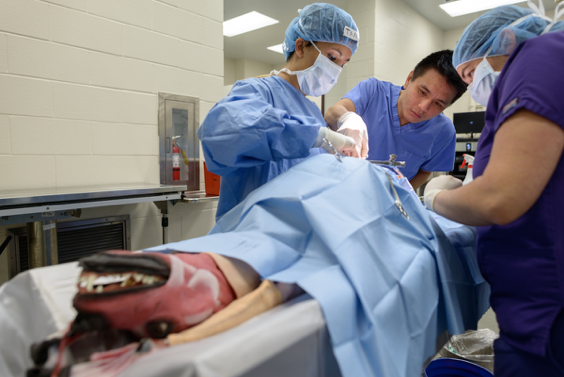
Curriculum review and revision is well underway, with first- and second-year students already participating in the new Clinical Skills initiative and in patient care. In addition, the college is now in its second year of participating in the Interdisciplinary Family Health Program, joining other UF Health colleges in this worthwhile partnership between the university and the Gainesville community. For the first time this year, in collaboration with Alachua County-area small animal practitioners, the college began offering an elective small animal practice-based clerkship, allowing students in their clinical rotations the ability to gain additional primary care experience in a real-world setting. This program is already receiving rave reviews from students and practitioners.
Patient Care
The UF Veterinary Hospitals made significant progress in many of the goals articulated in the past two years through our strategic planning process. These goals include enhancing the hospital’s reputation in specialty services, improving its operational model, enhancing communication to referring veterinarians, maximizing student learning opportunities and investing in the staff, house officers and faculty. The college continues to expand the clinical trials program and is actively pursuing accreditation of its diagnostic laboratories through the American Association of Veterinary Laboratory Diagnosticians.
The Night in the Swamp outreach program has continued to reach veterinarians around the state. Through this program, UF veterinary medical faculty members provide regional veterinary medical associations with continuing education over dinner. Over the past two years, we have hosted 31 such seminars in 18 different cities, from Miami to Pensacola, with a total of more than 1,000 attendees.
A new electronic medical record portal has been established to allow referring veterinarians to see discharge orders, lab tests and diagnostic images. Automatic electronic notifications are sent to referring veterinarians when significant events occur, providing timely relevant data. Operationally the UFVH has improved clinical efficiency and customer services in the call center, reception area and pharmacy. Additional staff have been hired to help leverage doctor time and enhance the patient’s experience.
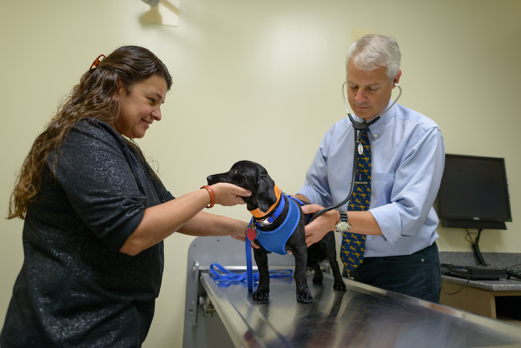 The UFVH continues to expand the Patient Quality and Safety program in collaboration with the UF College of Medicine. This is the first program in the nation that uses advanced software to track patient-related events and provides a framework for enhancing patient care. During the past year the team has focused on developing awareness and changing the culture within the UFVH.
The UFVH continues to expand the Patient Quality and Safety program in collaboration with the UF College of Medicine. This is the first program in the nation that uses advanced software to track patient-related events and provides a framework for enhancing patient care. During the past year the team has focused on developing awareness and changing the culture within the UFVH.
The UF Small Animal Hospital was a finalist in the Gainesville Sun’s 2016 Reader’s Choice Award contest, showing local support for the level and quality of services available to pet owners in our local community.
Overall hospital caseload continues to grow. Clinical service net revenue for the UFVH grew by 9.9 percent over FY 2015. In FY 2016, our caseload consisted of 36,674 in-hospital patients, including large and small animals, and in addition, 31,162 farm animals were treated. UF Pet Emergency Treatment Services in Ocala saw a net revenue increase of 14 percent and a 12 percent increase in caseload, with 5,576 patients.
Development
This past fiscal year marked yet another strong year for fundraising in the College of Veterinary Medicine — with nearly $24 million in charitable gifts. Support from friends of the college, which include grateful clients, contributed significantly to this success, providing approximately 73 percent, or $17.5 million. The Dean’s Circle of Excellence continues to grow, with 84 members having now raised more than $2.3 million since inception in 2010. Dollars raised increased by over 20 percent from FY 2015. Our Scholarship Initiative, a key college program to reduce student debt, already has raised $11 million in cash, pledges and estate commitments in its first two years of commitments.
2016 was indeed an extraordinary year. It is humbling and awe-inspiring to consider the extraordinary achievements of the UF colleges that are such an essential part of UF Health. Next week we will profile our UF Health hospitals and our research centers and institutes. Here’s to continued success in 2017!
Power of Together,
David S. Guzick, M.D., Ph.D. Senior Vice President for Health Affairs, UF President, UF Health
About the author
